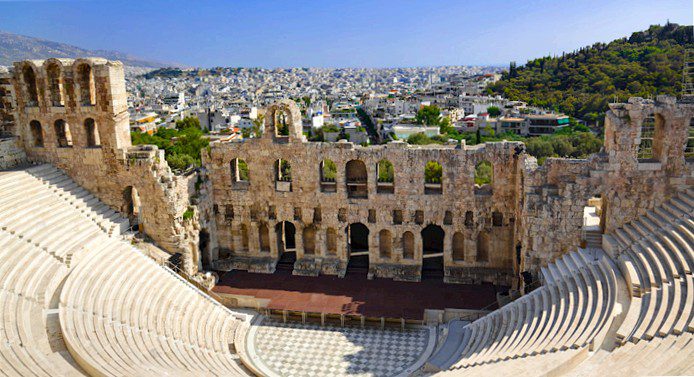
Surprisingly, Greece was one of the first countries in Europe to respond efficiently and with a detailed plan to the pandemic. It was also a once-in-a-lifetime opportunity to reboot the economy and put it on a more sustainable and inclusive path – a real turning point in Greece's development, says Nicolas Roth von Reyl.
Unlike many Western countries, Greece entered the Covid 19 crisis in a very different form: The country has been under new political leadership since the summer of 2019, which has brought with it an entirely new dynamic. The newly elected government of Prime Minister Kyriakos Mitsotakis has fired up all the engines for reform, from adjusting taxes to launching ambitious infrastructure projects like Ellinikon and other much-needed digital improvements, observes Nicolas Roth, Head of Alternative Assets at Reyl.
In January 2020, the government put together a committee chaired by Nobel laureate Christopher Pissarides and co-chaired by Athens University economics professor Nikos Vattas. Their goal was to develop a comprehensive approach that the government could use as a framework for future policies. Two months later, the Covid 19 pandemic spread around the world and Greece, potentially jeopardizing all efforts achieved in the early reforms. "However, the Greek government's response is a textbook example of "efficiency", stresses Roth.
EU aid package
In the spring and summer of 2020, the European Council began work on a series of support packages for its member states. The European Union quickly understood that the initial aid measures, such as PEPP, would not be enough. The damage caused by foreclosure across Europe could not be dealt with by the EU's traditional emergency fiscal package. After much debate and the usual squabbling between North and South, the EU approved its biggest aid package yet, called EU Next Generation, consisting of 750 billion. Euro in the form of grants and loans to member states exists – but not in the form of free stimulus packages, but with strings attached.
Its apparent first goal is immediate economic recovery and mitigation of the damage after the Covid-19 crisis. The second goal is to ensure that recipient countries make a green transition and digital transformation and become more sustainable and resilient. In this context, the EU mandated each member country to submit a detailed plan covering reforms and investments in six policy areas: green transformation, digital transformation, smart, sustainable and inclusive growth and jobs, health and resilience, education policy and upskilling.
Plan called "Greece 2.0"
In October 2020, Greece sent its first draft proposal to the European Commission, which showed how the country would use the stimulus funds available to it. The draft paper drew extensively on the work of the Pissarides Commission and worked with accounting firms that signed off on the various proposed budgets and reforms. The plan called "Greece 2.0" carries, was finally submitted to the Greek parliament at the end of March 2021. As a result, Greece was able to secure 17.8 billion. Euro in grants and 12.7 bn. Euro in loans secured and seeks to raise a total of 57 billion. Mobilize euros by promoting private investment through public-private partnership credit agreements.
Greece 2.0 is based on the four pillars of "Recovery and Resilience"-EU's plan: green, digital, social and an economic and institutional transformation. The green transformation will focus on a massive energy efficiency program for private and government buildings, improving inter-island power interconnections and upgrading infrastructure, and a reforestation program, among other initiatives.
As part of the digital transformation, the construction of a 5G corridor along highways to facilitate the use of autonomous vehicles and undersea internet cables connecting the mainland to islands to improve infrastructure are both ambitious milestone projects. "The state will continue its digital renaissance, which began during the crisis with the advent of online prescriptions, for example. The social aspect is very much focused on education and workforce skills development. As Alex Patelis mentioned, the government will not give out free money for projects, but will co-invest alongside banks and investors. Finally, the loans will not be given by the Greek state, but by reputable and experienced financial institutions such as the EBRD", Roth further explains.
Turning point in Greece's development
This plan, he said, was not only bold and ambitious, but its entire construct was a complete departure from the previous approach. As Akis Skertsos explained in a speech to parliament, in the past Greece received EU funds and then decided how it would distribute them. Greece 2.0 was built in the opposite way: first a plan was devised before getting the appropriate financing to execute it. Thanks to the work of the Pissarides Commission, it was not only possible to create a detailed plan, but also a unique opportunity to reboot the economy and put it on a more sustainable and inclusive path – a real turning point in Greece's development.
Prior to the Covid 19 crisis, Greece was already well advanced in the process of rehabilitating its banking system, which was burdened with bad loans, and managed to attract an impressive array of international investors. Greek banks have sold very large portfolios to the market; the asset management ecosystem is very dynamic and rating agencies recently upgraded Greek banks, which was an important milestone. "With the banking sector in much better shape, Greece's 2.0 at a critical time for the country and can rely on a functioning banking system. The government has already begun to deliver in several aspects, and Greece 2.0 is a once-in-a-lifetime opportunity to reset and refocus the country and make it a much-anticipated successful turnaround story", Roth concludes.